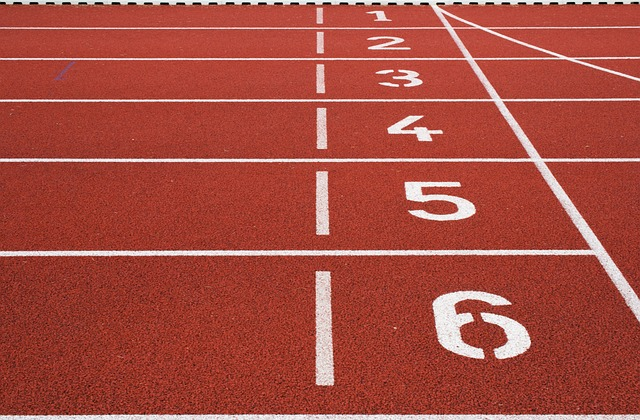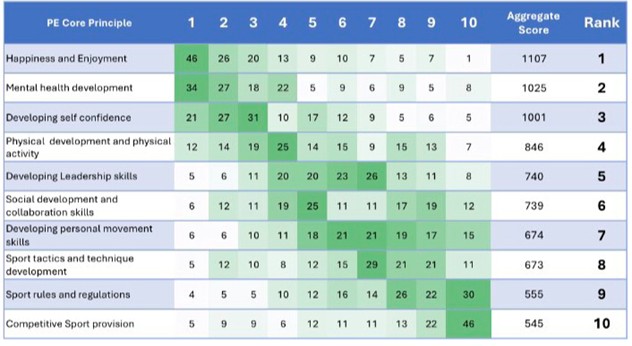
I’ve no doubt my experience is far from unique.
Conforming to the status quo
For years I delivered a curriculum that reflected my own experiences of PE as a student; predominantly invasion games throughout the year, a block of athletics and a sprinkling of tennis and baseball in the summer term. Every student took part and behaviour was good, so I assumed everyone happy and was learning.
I found myself delivering what had always been delivered; the tried and tested, the age-old traditional offer. I was doing it “right”. I taught with a distinct focus on sports performance with tactics and techniques forming the basis of my approach.
When it came to assessment, students were levelled accordingly by the performance they demonstrated in those activities. Conscious competence told me I was delivering effective physical education for my learners; a notion further reinforced by picking up a few national trophies with boys and girls teams. I was stood on my very own Mount “Dunning-Kruger”, and the view was beautiful.
Many experienced climbers often say that descending a mountain can be more tricky than climbing it. Conquering my own Mount Dunning-Kruger didn’t really require much effort at all, because like everyone else who’s stood on it, I couldn’t really explain in any detail how I got up there. Seemingly, there was no metaphorical climbing required. Despite this, I’ve always been one to look at something and think “was that the best approach?”.
Questioning the relevance of my practice
Before COVID-19 and prior to me becoming my departmental lead, the itch of discontent with “physical education” set in and I found myself questioning the relevance of my subject to my students. It soon dawned on me that I was not teaching particularly well at all – In fact I was coaching in curriculum time.
My whole approach was constructed for and directed at those students who already enjoyed or were already involved in sport – the “sports enthusiasts”. If these characters only made up 10% of my class, what were the 90% getting from me? (Sport England, 2014) Was I developing positive relationships with movement in everyone? Did I meet the needs of all of my learners? or was I causing more harm (to the relationship with movement) than good?
I’d quickly realised my programme was not delivering the outcomes that many in the PE world often preach, almost dogmatically, that our subject guarantees: “resilience”, “character” … insert your own favourite buzzword here.
In fact, I doubt I was even affecting increased physical literacy – the so-called “bread and butter” or underpinning aim of our subject. On reflection, I was delivering a curriculum for me through activities I enjoyed and felt confident delivering – I was living vicariously through my students. A “disconnect” between the curriculum choices made by PE teachers and preferences of students is something that Banville et al. (2021) identify and I soon saw disconnects at every avenue in my teaching. The recognition of my own conscious incompetence as a PE teacher then hit me hard.
Back in the learning pit
Following a humbling slide down the mountain I’d found myself alarmed to be atop, I found myself scrambling in the learning pit of struggle by hitting the “reset” button on what I recognised as high-quality physical education. Being consciously incompetent sounds a terrible thing, but it’s more a recognition that there’s plenty you don’t know yet – and that’s quite exciting. Reading about my subject become a non-negotiable part of my practice. Engaging with the PE world and learning from the approaches and experiences of others become essential and necessary. After all, you’re able to see much further if you stand on the shoulders of giants.
So with that in mind, I reached out to people like Will Swaithes who helped me reframe PE as ‘positive experiences’, and began closely re-studying models-based PE (Casey & Kirk, 2021) and particularly the work of Professor David Kirk (2020; 2021), whose work on “precarity” and what he terms “pedagogies of affect” has had a particular impact on my approach to teaching in my school’s context.
Additionally, courses via PE Scholar encouraged me to reframe and re-articulate my “why” whilst providing invaluable guidance on how to ensure PE becomes a valuable experience for students in my school. Identifying my own professional development needs has been and continues to be key in developing my knowledge and pedagogy to be excited about change. And big changes, at least here in Wales, are now required.
Curriculum for Wales 2022: The Health and Wellbeing Area of Learning and Experience
The Curriculum for Wales is, in timely fashion, nudging PE leads to rethink their approach to PE. The Health and Well-being ‘Area of Learning Experience’ (AoLE) (Welsh Government, 2020) advocates a holistic approach to health and well-being through its 5 ‘What Matters Statements’(WMS):
- Developing physical health and well-being has lifelong benefits.
- How we process and respond to our experiences affects our mental health and emotional well-being.
- Our decision-making impacts on the quality of our lives and the lives of others.
- How we engage with social influences shapes who we are and affects our health and well-being.
- Healthy relationships are fundamental to our well-being.
Put simply, the dominant delivery of PE, with its focus on sports performance, tactics and techniques, facilitated demonstrably through a command style, doesn’t appear to earn its place in the interests of enough students today to impact long term commitment to physical activity, nor work effectively to develop skills and understanding required within the New Curriculum for Wales WMS.
The New National Curriculum for Wales has been a great catalyst to help us begin a much needed re-framing of the PE curriculum alongside our own context specific insights of how we can improve our offer to inspire more children to be engaged in their learning and make more of a difference to their engagement in physical acitivity.
Meaningful PE experiences
The report card issued to Wales by the Active Healthy Kids Global Alliance (2022) paints a damning picture of national physical activity levels that lends some support to this, with only between 13-17% of 11-16 year olds achieving 60 minutes of physical activity per day. The report certainly highlights a need to refocus on how we develop healthy confident individuals who engage regularly in physical activity throughout their lifetime.
I’m not saying that PE can be single-handedly responsible for correcting the poverty of movement or health-woes of society, but I am saying that more meaningful physical education might just provide the relevant experiences required for students to select physical activity for their immediate and future gratification and to, hopefully, ‘connect’ physical activity with their joy, health and wider flourishing.
Pedagogies of affect (Kirk, 2021) could be a vital component of that process in your context. That’s one small step for your PE department, one giant leap for your students (away from the sofa).
A starting point

Phil Mathe, in his book “Happiness Factories” (2022) recalls how he sought out what PE teachers around the world considered their most important PE principles. He highlights in the book, with fantastic contributions from around the globe, how PE is being taken forward in different settings. But when considering where you go next, there are stakeholders whose principles will really need to be understood – your students.
There is no one-size-fits-all when it comes to a PE curriculum, and there is no “right” way to teach it.
You cannot copy and paste a curriculum from one school to another, so when trying to ‘connect’ students to a curriculum intended to be relevant to them, it’s vital to understand what the students in your setting believe, need and value. After all, it’s about them, not us.
I developed and carried out a student voice activity with 144 students where I asked them to rank 10 ‘principles’ of PE in order of personal importance.

The table shows the aggregate rank order of principles considered by students from 1st (most important to students) to 10th (least important). Take a moment to study the results and consider the following:
- How would your department react if those results were from your own students?
- Might results like this make you consider changes to your current curriculum? If so, would you know what changes to make to ensure you were meeting the needs of your students?
- Do you know what your students need? What sources of information do you have to support this?
The results of this exercise highlighted a glaring issue in my own setting and critical reflection helped us understand that our curriculum did not impact the principles that our students were telling us they valued. Instead, our curriculum focused, almost exclusively, on the principles that lacked meaning or relevance to the vast majority of the children’s preferences. Depending on your own context, the bottom 3 ranked principals may or may not surprise many PE teachers, but there it was – our ‘disconnect’.
Embracing a variety of perspectives
Perhaps similarly to your own, my department houses different ideologies when it comes to PE and its purpose and I consider this to be a key strength. It allows us to discuss solutions from a variety of perspectives. But recognising our own ‘disconnect’ has allowed us to have conversations about what is within our capacity to change collectively, albeit with enthusiasm or, sometimes, pragmatism. Our steps are small but they’re forward.
Adapting our Curriculum inline with the New Curriculum for Wales
Our initial response has been to begin incorporating elements of the Concept Curriculum 2.0, presented by PE Scholar’s Lee Sullivan, to provide students with engaging hooks that perhaps were not present before and the initial feedback across the deparment and student body has been incredible.
Additionally, my department has been challenged to explore pedagogies of affect and implement them where appropriate with students who require the experiences they respectively provide. We have also adopted a “Heads, Heart, Hands” approach to teaching and gauging progress to ensure that students know they can excel in PE through other learning domains in addition to the physical.
We’re far from the finished article, but we’re also getting comfortable with the idea that that this is a journey with no end point. It’s likely that our curriculum will evolve year by year based on the needs of the cohort in front of us, and more likely, the class in front of us at any given time – flexibility is vital. I’ll be excited to share our developments in the not-so-distant future.
The disconnect between core PE and GCSE PE

Interestingly, disconnecting the ‘disconnect’ between PE curriculum decisions and the needs of students has historically been complicated by school timetabling structures (Kirk, 2010) and the pressures to prepare students for GCSE PE practical performance. But the cause for change in Wales has been helped with the release of information about the proposed structure of the new Physical Education and Health GCSE from 2025/2026, whereby students be may afforded the choice of pathways in the practical assessment element of the course:
- Promoting and delivering physical activity and sports participation events
- Coaching and personal training activities
- Performance in individual or team sports or other relevant activities.
I’ve long heard ‘but that’s what’s required at GCSE’ as the justification for curriculum approaches, but with options other than practical sports performance now potentially invalidating that argument, it’s a perfect time for PE leaders to reconsider their ‘why’ and their ‘who’. After all, the majority of students you work with to foster a love of and positive relationship with movement in all its forms will never undertake a PE qualification.
Physical education should provide positive experiences for all. Finding out what your students consider positive experiences would be a great start when seeking to disconnect any ‘disconnects’ in your curriculum.
Moving forwards
How are you implementing the new Curriculum for Wales? Does your journey sound similar to ours or are you taking a different? Share the steps your school are taking in the comments section below.
References
- Active Healthy Kids Global Alliance (2022) Active Healthy Kids Wales Reports Card [Online] Available at: https://www.activehealthykids.org/get.php?file=wales-poster-2022.pdf [accessed 25 Oct 2022]
- Banville, D., Marttinen, R., Hodges Kulinna, P., & Ferry, M. (2021) Curriculum decisions made by secondary physical education teachers and comparison with students’ preferences, Curriculum Studies in Health and Physical Education, 12:3, 199-216
- Casey, A. and Kirk, D. (2021) Models-based practice in physical education. Abingdon: Routledge.
- Kirk, D. (2010) Physical Education Futures, London: Routledge
- Kirk, D. (2020) Precarity, Critical Pedagogy and Physical Education, London: Routledge.
- Kirk, D. (2021) Precarity, the health and wellbeing of children and young people, and pedagogies of affect in physical education-as-health promotion [Online] Available at: https://pure.strath.ac.uk/ws/portalfiles/portal/131075429/Kirk_ED_2021_Precarity_the_health_and_wellbeing_of_children_and_young_people_and_pedagogies_.pdf [Accessed 25 Oct 2022)
- Mathe, P. (2022) Happiness Factories: A success-driven approach to holistic Physical Education. John Catt
- Sport England (2014) Under the Skin. [Online] Available at: https://sportengland-production-files.s3.eu-west-2.amazonaws.com/s3fs-public/youth-insight_under-the-skin.pdf [Accessed 25 Oct 2022]
- Welsh Government (2020) Area of Learning Experience: Health and Wellbeing. [Online] Available at: https://hwb.gov.wales/curriculum-for-wales/health-and-well-being/ [Accessed 4 November 2022]


The concept curriculum is something we are using to implement the Curriculum for Wales up North. So far so good!
[…] my previous blog, I touched on how I’d begun to adopt ‘pedagogies of affect’ (Kirk, 2010, 2021; Casey & […]